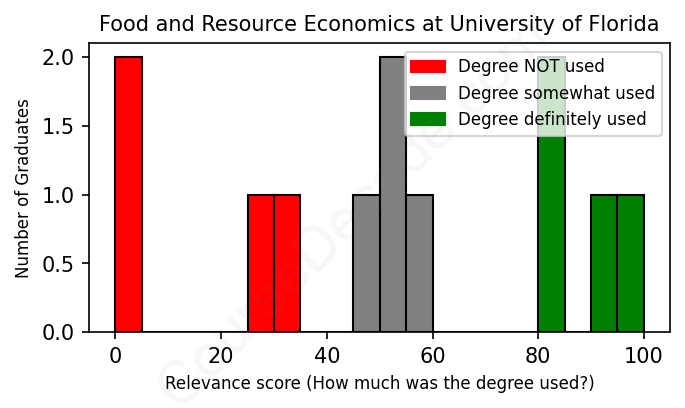
First, some facts. Of the Food and Resource Economics graduates from University of Florida we've analyzed , here's how many have used (or NOT used) their degree in their career:

These are estimates based on AI analysis of 12 LinkedIn profiles (see below).
The verdict? Significantly below average. Overall, with an average relevance score of 52%, Food and Resource Economics graduates from University of Florida have a much lower likelihood (-15%) of finding work in this field compared to the average graduate across all fields:
And for comparison, here's the chart for all profiles we've looked at across all degrees.
Also, after graduating, only 25% of these graduates have pursued further education other than another Bachelor's degree (such as a Masters degree or other), compared to the average across all profiles of 35%. This suggests a Bachelors degree is enough for most Food and Resource Economics graduates, and it's normal to look for work straight after graduation.
See the details:
|
Relevance score: 80% We think this person has gone into a career highly relevant to their degree. We think this person has gone into a career highly relevant to their degree.
DEGREE INFOGraduated in 2012 from University of Florida with a Bachelor of Science (B.S.) in Food and Resource Economics. No other secondary education since. JOB HISTORY SINCE GRADUATIONCampus Ambassador The Emory Group/ Geneologie Aug 2012 - Dec 2012 Account Executive  Headway Facilitation Marketing Jan 2013 - May 2015 Specialist, Loyalty  Southeastern Grocers Oct 2015 - Apr 2017 Manager, Sales Planning and Events  Southeastern Grocers Apr 2017 - Mar 2018 Senior Manager, Merchandising  Southeastern Grocers Mar 2018 - May 2022 Director of Sales Planning, Merchandising  Southeastern Grocers May 2022 - Present ABOUTExperienced Director with a demonstrated history of working in both marketing and merchandising in grocery retail. Determined professional with a Bachelor of Science (B.S.) in Food and Resource Economics from the University of Florida. |
The top 10 most common jobs done by the graduates we've analyzed (ranked most common to least) are:
When looking at the job trajectories of University of Florida graduates with a degree in Food and Resource Economics, it’s pretty clear that there’s a mix of relevance to their field. A significant number of graduates have found themselves in roles related to sales, operations, and management at various companies, particularly in the food industry. While some of these positions, like the Senior Manager in Merchandising at Southeastern Grocers or the Project Coordinator at MIC Food, directly apply skills from their degree—such as market analysis, pricing strategies, and resource management—many others veer off into areas that don't fully utilize their specialized knowledge.
Overall, the common trend is that while some graduates have managed to secure positions closely aligned with their studies in economics and resource management, a large portion of them end up in jobs that are only tangentially related. Sales roles, general management jobs, and administrative positions dominate the landscape, and these tend not to leverage the specific principles of Food and Resource Economics regularly. So, while it’s not uncommon to see alumni working in roles that touch on economic issues, the direct application of their academic background in daily tasks seems to be less common overall.
Here is a visual representation of the most common words in job titles for Food and Resource Economics graduates (this is across all Food and Resource Economics graduates we've analyzed, not just those who went to University of Florida):

From looking at the career trajectories of graduates with a degree in Food and Resource Economics from the University of Florida, it seems like most of them are carving out paths that are at least somewhat related to their field. For many, their first jobs after graduation tend to be in positions that involve analysis, project management, or roles within the food and resource sectors, like logistics and operations. Some land pretty decent roles early on, like a Logistics and Operations Specialist or an Analyst, which is great because it shows they are leveraging their degrees effectively right after school.
Fast forward five to ten years, and you'll see a mix. A number of graduates have moved up the ranks into managerial or senior positions, particularly in industries tied to food, logistics, and sales planning. For instance, the grad who went from a campus ambassador to a Director of Sales Planning definitely shows a successful climb. However, there are also some who have veered off path into unrelated fields or lower-tier jobs, like retail clerks and administrative roles, which doesn’t quite reflect the potential of a degree in this area. Overall, while some graduates have found solid career paths relevant to Food and Resource Economics, others appear to have taken routes that stray from their initial studies. This mix gives a pretty realistic picture of what to expect after graduating: it can be good, but not everyone hits the jackpot right away.
Honestly, a Bachelor’s degree in Food and Resource Economics at the University of Florida is about on par with other social science degrees—it's definitely not a walk in the park, but it's not the hardest one out there either. You’ll dive into some interesting topics like economics, agriculture, and environmental issues, and while you’ll have to pick up analytical and quantitative skills, it’s generally manageable if you stay on top of your studies and engage with the material. Some students find parts of it a bit challenging, especially the math-heavy courses, but with dedication and the right support, many end up doing just fine. So if you're interested in the subject matter, it could be a great experience!
Most commonly, in the LinkedIn profiles we've looked at, it takes people 2 years to finish a Bachelor degree in Food and Resource Economics.
Looking at the job history of these University of Florida Food and Resource Economics grads, it seems like some of them are doing pretty well, while others might be struggling a bit financially. For instance, the 2012 graduate who's now a Director of Sales Planning with Southeastern Grocers is likely making a decent salary, especially since they’ve climbed the ladder pretty quickly. Meanwhile, you’ve got the 2014 graduates working as a grocery clerk and a produce clerk, which probably isn’t bringing in big bucks. On the other hand, positions like the one at Walmart and the consultant roles suggest a pretty good income too. Overall, it seems like there’s a mix—some are definitely on a path to decent money, while others haven’t quite hit that mark yet.
Here is a visual representation of the most common words seen in the "about" section of LinkedIn profiles who have a Bachelor degree in Food and Resource Economics (this is across all Food and Resource Economics graduates we've analyzed, not just those who went to University of Florida). This may or may not be useful:

Here are all colleges offering a Bachelor degree in Food and Resource Economics (ordered by the average relevance score of their Food and Resource Economics graduates, best to worst) where we have analyzed at least 10 of their graduates:
| College | Score | Count |
|---|---|---|
 University of Florida University of Florida
|
52 | 12 |